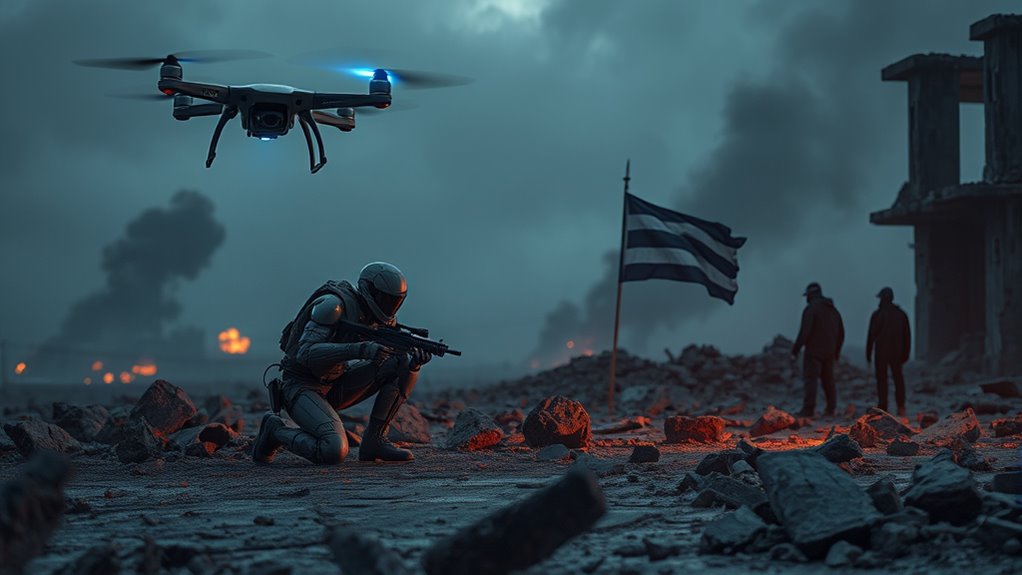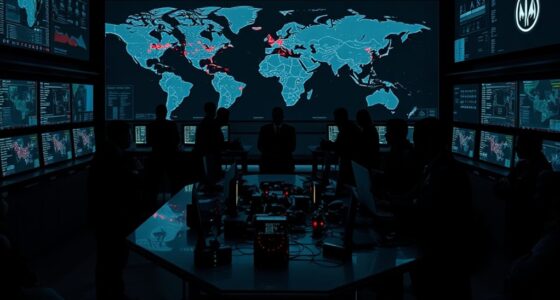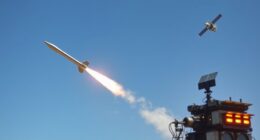Artificial intelligence is rapidly changing how wars are fought, pushing you to rethink the laws that govern armed conflict. New AI-powered weapons and decision-making tools challenge existing rules, raising ethical questions about accountability and safety. You might wonder how international laws adapt to these changes. If you want to understand how AI is reshaping warfare and what new regulations may emerge, there’s more to discover beyond the basics.

Have you noticed how modern conflicts are reshaping the way wars are fought? The introduction of artificial intelligence is transforming military strategies, challenging long-standing laws of armed conflict, and raising profound ethical questions. As AI becomes more integrated into military systems, it’s altering the landscape of warfare, making it faster, more precise, and potentially more devastating. This shift compels you to consider how existing legal frameworks, like the Geneva Conventions, can adapt to these technological advancements.
AI-driven weapons can make decisions at speeds beyond human capacity, which raises concerns about accountability. When a drone or autonomous weapon system targets a threat, who is responsible if civilians are harmed? Traditional laws emphasize human oversight, but as machines take on more autonomous roles, the lines of accountability blur. This creates a dilemma: should the laws evolve to include new standards for machine decision-making, or do we need entirely new regulations? The challenge lies in balancing the benefits of AI—such as reducing soldier casualties and increasing operational precision—with the risks of unintended consequences and civilian harm.
Another pressing issue revolves around the ethical implications of autonomous weapons. These systems can potentially select and engage targets without real-time human input, which some experts argue dehumanizes warfare. You might ask yourself whether delegating lethal decisions to algorithms aligns with moral principles and international norms. Critics warn that removing humans from the decision loop could lead to unanticipated escalation or misuse, especially if AI systems are hacked or malfunction. Meanwhile, proponents argue that AI can reduce errors caused by fatigue or emotional bias and improve compliance with international laws by strictly adhering to predefined rules.
International discussions are ongoing about how to regulate AI in warfare. Countries are debating whether to ban fully autonomous lethal weapons or to establish strict standards for their development and use. These debates emphasize the importance of transparency, verification, and accountability but face hurdles due to differing national interests and technological capabilities. You need to understand that the rapid pace of AI development can outstrip the ability of legal frameworks to keep up, which may lead to a period of uncertainty where new weapons operate in a legal gray area.
Ultimately, AI is forcing you to reconsider what constitutes lawful and ethical conduct in war. The existing laws of armed conflict weren’t designed for autonomous systems, and adapting them requires international cooperation, innovative legal thinking, and a commitment to human rights. As technology advances, your role involves staying informed and advocating for regulations that prioritize human dignity and safety amid this new, unpredictable battlefield landscape.
Frequently Asked Questions
How Do Existing Laws Apply to Autonomous Weapons?
Existing laws require you to distinguish between combatants and civilians, and to avoid unnecessary suffering. When using autonomous weapons, you must program them to follow these principles, ensuring human oversight. You’re responsible for their actions, so you need clear accountability pathways. Laws also demand transparency and adherence to treaties. If autonomous systems violate these rules, you could face legal consequences, making strict regulation and supervision essential for compliance.
Can AI Decision-Making Be Held Accountable Legally?
You might think AI decision-making can’t be held accountable legally, but it can. When AI systems make decisions, the responsible parties—like developers, commanders, or operators—are held accountable under existing laws. You should know that accountability depends on clear oversight, proper deployment, and adherence to legal standards. So, even with autonomous systems, humans remain ultimately responsible for ensuring lawful actions and addressing any violations.
What Safeguards Prevent AI From Violating International Law?
You can implement safeguards like strict oversight, transparent algorithms, and clear accountability structures to prevent AI from violating international law. Regular audits and human-in-the-loop systems guarantee decisions align with legal standards. International treaties and norms also set boundaries, holding developers and operators responsible. By integrating these measures, you reduce risks of unlawful actions, ensuring AI operates ethically and legally within armed conflict contexts.
How Will AI Impact Civilian Protection During Conflicts?
AI can substantially improve civilian protection during conflicts by enabling faster, more precise targeting and threat identification. You’ll see AI helping to minimize collateral damage and prevent unintended harm. However, you must also be cautious, as reliance on AI might lead to errors or misuse. Continuous oversight, strict legal frameworks, and ethical guidelines are essential to ensure AI enhances civilian safety without violating international law.
Are There International Efforts to Regulate AI in Warfare?
Yes, international efforts are underway to regulate AI in warfare. You should know that organizations like the United Nations and various treaties are working to establish norms and guidelines to guarantee AI is used ethically and responsibly. These initiatives aim to prevent misuse and reduce risks to civilians. While progress is ongoing, you need to stay informed about evolving policies to understand how AI’s role in conflict is being shaped globally.
Conclusion
As you consider the evolving landscape of AI in warfare, it’s tempting to believe technology alone can redefine the laws of conflict. However, history suggests that human judgment remains vital in applying these new tools ethically. While AI offers advancements, it also challenges traditional norms—prompting you to question whether laws can truly keep pace. Ultimately, you must recognize that the core principles of humanity continue to shape how we navigate the complex future of war.









